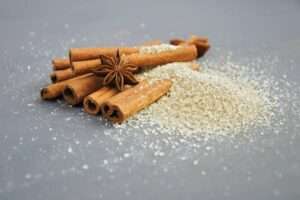Introduction:
The cinnamon spice known as “Ceylon cinnamon,” commonly referred to as “true cinnamon” or Cinnamomum verum, is made from the inner bark of Sri Lankan (formerly known as Ceylon) native trees. The second major variety of cinnamon sold on the market is Cassia cinnamon (Cinnamomum cassia), and this one is one of them. Nutrition facts of Ceylon cinnamon have different perspectives and it has a sweeter, more delicate flavor when compared to cassia cinnamon.

Citrus and faintly flowery tones are frequently used to characterize it. On the other hand, cassia cinnamon has a powerful, spicy aroma with a whiff of bitterness. The tiny, delicate cinnamon coils from Ceylon feature numerous layers of paper-thin bark that are readily broken. The Nutrition facts of Ceylon cinnamon has different sticks from cassia are larger, darker, and more rugged in appearance.
Nutrition Facts of Ceylon Cinnamon:
Like other spices, Ceylon cinnamon is used sparingly, therefore its macronutrient content is typically minimal. But it does have traces of several nutrients in it:
Carbohydrates
Ceylon cinnamon includes some carbs, primarily in the form of dietary fiber and simple sugars. Due to the often small meal size, cinnamon’s carbohydrates do not provide a substantial source of energy.
Dietary Fiber
Cinnamon, particularly Ceylon cinnamon, has a negligible quantity of this substance. The health benefits of fiber, due to the nutrition facts of Ceylon cinnamon a form of carbohydrate that the body cannot digest, include supporting digestive health and assisting with blood sugar regulation. Cinnamon is not a significant source of dietary fiber, though, as a typical serving only has a small amount of fiber.

Protein
Cinnamon has a relatively low protein content. Nutrition facts of Ceylon cinnamon contains a negligible amount of protein, making it an unimportant supply of this macronutrient even though protein is necessary for several body processes, including tissue growth and repair.
Fat
Cinnamon from Ceylon is essentially fat-free. Like protein, fat is a necessary macronutrient that is crucial for many bodily functions, including the storage of energy. To meet even a small amount of your daily fat requirements with cinnamon, though, would require consuming a lot of it.
Vitamin K
Function: Vitamin K is necessary for healthy bone development and blood coagulation. It is crucial in triggering the proteins required for these tasks. Vitamin K’s presence in Ceylon cinnamon: Although Ceylon cinnamon is a minor source of vitamin K, it does contain extremely modest amounts of the vitamin. Better sources of vitamin K include other foods including leafy greens, broccoli, and Brussels sprouts.
Calcium
Function: Calcium is necessary for the development and maintenance of healthy bones and teeth. Additionally, it has an impact on muscular contraction, neuron transmission, and blood coagulation. The presence of calcium in Ceylon cinnamon: Calcium is present in Ceylon cinnamon, however, it is not the main source of this mineral. Calcium-rich foods include leafy green vegetables, fortified meals, and dairy products.
Health Benefits of Ceylon Cinnamon:
Due to its special components, the nutrition facts of Ceylon cinnamon, commonly called “true cinnamon,” are thought to have several possible health advantages. Including Ceylon cinnamon in your diet may provide certain advantages, but it shouldn’t be used as a replacement for medical care. The following are five possible health advantages of Ceylon cinnamon:
Blood Sugar Regulation
Ceylon cinnamon may aid in enhancing insulin sensitivity and lowering blood sugar levels. According to some research, cinnamon may lessen insulin resistance, which is advantageous for people with type 2 diabetes or those who are at risk of getting it. Additionally, it might assist in reducing post-meal blood sugar rises.

Antioxidant Qualities
Nutrition facts of Ceylon cinnamon, in particular, are high in antioxidants. Antioxidants assist in the body’s defense against dangerous free radicals, which lowers oxidative stress and inflammation. It can promote general health and help reduce the risk of chronic diseases.
The Effects of Inflammation
Cinnamaldehyde, a compound found in Ceylon cinnamon, has anti-inflammatory qualities. Reducing inflammation can improve health because it has a role in many chronic diseases.
Heart Health
By enhancing lipid profiles, cinnamon may enhance heart health. While keeping or raising HDL (good) cholesterol levels, it reduces triglycerides and LDL (bad) cholesterol. A lower risk of heart disease is linked to these alterations in lipid levels.
Natural Antibacterial Qualities
Ceylon cinnamon has antimicrobial capabilities. It has the potential to be helpful in the battle against infections since it can stop the growth of bacteria and fungi. According to some studies, it may be added to oral hygiene products since it can aid in the fight against mouth bacteria.
The Best Way to Include Ceylon Cinnamon into Your Diet:
Ceylon cinnamon is a tasty and perhaps healthy supplement to your diet that you can use in food and beverages. Nutrition facts of Ceylon cinnamon have a warm, aromatic flavor that can improve many recipes. It can be used in savory and sweet dishes. Here are some inventive methods for including cinnamon in your diet:
Drinks With Cinnamon Spice
- For a comforting and aromatic touch, sprinkle a pinch of cinnamon over your morning brew of coffee, tea, or hot chocolate.
- Soak a cinnamon stick in hot water to make cinnamon water. For added taste, you may also include a wedge of lemon.
Oats and Cereals
For a tasty and wholesome breakfast, sprinkle Ceylon cinnamon on your oatmeal, cereal, or yogurt. Fruits like apples, bananas, and plums go nicely with it.
Smoothies
For extra flavor and potential health advantages, add Ceylon cinnamon to your smoothies. It goes nicely with foods like honey, almond milk, and bananas.
Baking
Add Ceylon cinnamon to cookie, muffin, bread, and cake recipes. It’s a traditional component of dishes like apple pie and cinnamon rolls.
- For a lovely finish, sprinkle some cinnamon on top of your baked products before serving.
Spicy Nuts
For a tasty and flavorful breakfast, toss nuts (such as almonds, walnuts, or pecans) with cinnamon, sugar, and a dash of salt before baking. Click to learn more.
FAQs:
- Is the cinnamon from Ceylon and Cassia the same thing?
No, they are unique cinnamon cultivars with differing tastes and coumarin levels.
- Is it safe to regularly consume Ceylon cinnamon?
The majority of people generally deem it safe in moderation.
- How much Ceylon cinnamon should you consume every day to reap the health benefits?
There is no set daily dosage; instead, it varies according to each person’s needs.
- Can cinnamon from Ceylon help control blood sugar levels?
According to some studies, it may help control blood sugar, but for advice, speak with a healthcare provider.
- Does ingesting Ceylon cinnamon have any negative effects?
When consumed in moderation, side effects are uncommon, but excessive consumption can result in negative effects.
Conclusion:
Last but not least, Nutrition facts of Ceylon cinnamon, sometimes referred to as “true cinnamon,” is a distinctive and tasty spice that may have several health advantages. Its advantages include potential blood sugar management, antioxidant qualities, anti-inflammatory effects, support for heart health, and natural antibacterial capabilities, despite having a milder and sweeter flavor than other varieties of cinnamon.
However, it’s crucial to consume cinnamon in moderation as part of a healthy diet and seek personal advice from a healthcare provider, particularly if you have any particular health issues or in certain situations. A tasty and fragrant method to make use of the nutrition facts of Ceylon cinnamon’s potential advantages is by adding it to your dishes and beverages. Click to learn more.

